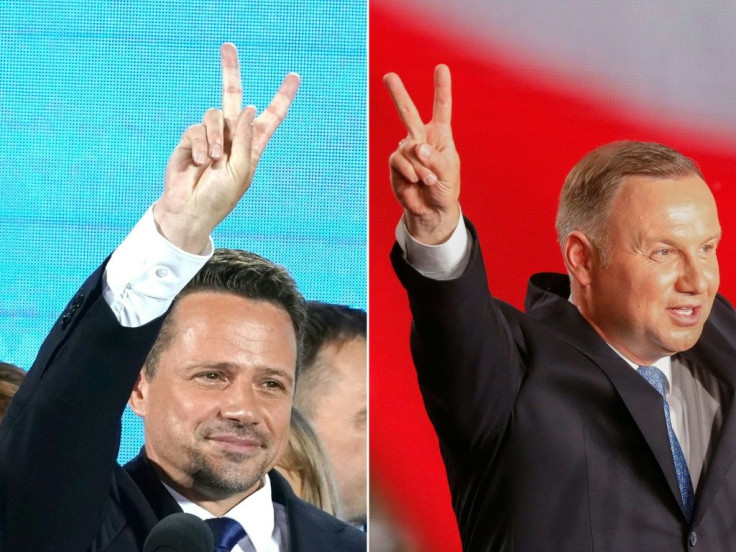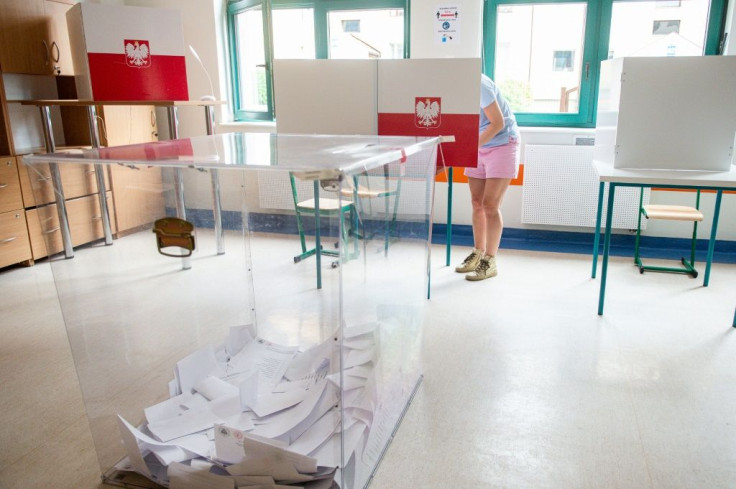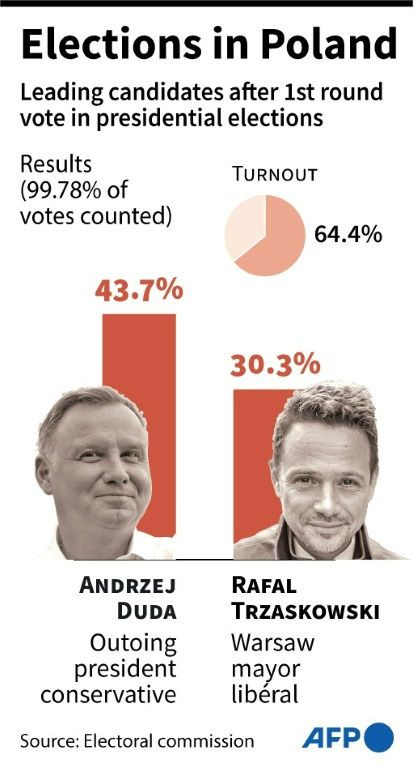Two Polands To Fight For Presidency In Run-off
Two Polands will battle it out in a presidential run-off next month -- the often rural, older voters of the conservative incumbent against the younger city dwellers who mostly support Warsaw's liberal mayor.
The current head of state Andrzej Duda, backed by the governing right-wing Law and Justice (PiS) party, emerged from round one on Sunday in pole position with 43.7 percent of the ballot.
Runner-up Rafal Trzaskowski got 30.3 percent, taking the Civic Platform (PO) member into round two on July 12, according to near final results from the national election commission.
Duda is expected to highlight the generous social benefits introduced on his watch as well as the Catholic values he holds dear, while Trzaskowski will probably stress his pro-democracy and pro-Europe programme.

Once the exit polls were out, the rivals -- both 48 years old -- lost no time in wooing those who backed the other nine candidates, as they climbed right into their campaign buses and set off to meet voters.
One poll by Ipsos showed that in round one Trzaskowski proved more popular than Duda among voters under the age of 29, as well as in cities with populations of over 200,000 people.
Duda meanwhile fared better than Trzaskowski in smaller-sized cities and towns, as well as in villages, where he won by a landslide. Duda also attracted more older voters, especially those 50 years and up.

"I think there's a chance the current president will win in the run-off but he'll have to work hard," Michal, a 43-year-old lawyer, told AFP.
Fellow voter Urszula however said she was crushed by the results.
"It's with a heavy heart that I note that if PiS voters rally, it'll be tough," the 60-year-old librarian told AFP.
"The people need to wake up. Maybe the heat and the coronavirus will rouse them!"

Duda and Trzaskowski will strive to attract those who backed the independent candidate Szymon Holownia, who came in third with 13.85 of the vote, and the far-right candidate Krzysztof Bosak, who got 6.75 percent of the ballot.
Analysts say many of those who voted for one of the also-rans did so in protest against Duda and the government, suggesting they could back Trzaskowski in the run-off.
The liberal candidate has "a lot of room for manoeuvre" in attracting voters from the others, said Maciej Onasz, a political analyst from the University of Lodz.
"I think it'll be a brutal contest resorting to fear. Both parties will opt to mobilise voters in a negative way, against their opponent," he said, quoted by the Gazeta Wyborcza daily.
During the campaign, Duda stoked controversy by echoing PiS attacks on gay rights and Western values, likening "LGBT ideology" to a new form of communism.
On Monday, Duda warned that coexistence between a liberal president and a conservative government would lead to political warfare and even early elections.
"It would mean a major confrontation between the government and the president, which is always bad for Poland," Duda said.
"It would block all activity, leading to the overthrow of the government."
For Trzaskowski, the problem is the conservatives' tight grip on power.
"What hurts us is this government's monopoly on power. They have politicised every institution, every oversight institution, in such a way that it is hard now to hold them accountable," Trzaskowski said on Monday.
"The government and the president believe that the people are there to serve those in power, when in fact it's those in power who should be serving the people."
Were Trzaskowski to win, it would spell trouble for the PiS government, which has run afoul of critics at home and abroad for judicial reforms that the EU says threaten the rule of law.





















